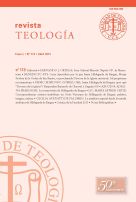Por favor, use este identificador para citar o enlazar este ítem:
https://repositorio.uca.edu.ar/handle/123456789/6842| Campo DC | Valor | Lengua/Idioma |
|---|---|---|
| dc.contributor.author | Fraboschi, Azucena Adelina | es |
| dc.date.accessioned | 2019-06-19T23:36:55Z | - |
| dc.date.available | 2019-06-19T23:36:55Z | - |
| dc.date.issued | 2014 | - |
| dc.identifier.citation | Fraboschi, Azucena Adelina. La cosmovisión de Hildegarda de Bingen [en línea]. Teología, 113 (2014) Disponible en: https://repositorio.uca.edu.ar/handle/123456789/6842 | es |
| dc.identifier.issn | 0328-1396 | - |
| dc.identifier.uri | https://repositorio.uca.edu.ar/handle/123456789/6842 | - |
| dc.description.abstract | Resumen: El título de Doctor de la Iglesia, en palabras del Cardenal Amato, Prefecto de la Congregación para las Causas de los Santos, es conferido a quienes “con su eminente doctrina han contribuido a la profundización del conocimiento de la divina Revelación, enriqueciendo el patrimonio teológico de la Iglesia y procurando a los fieles el crecimiento en la fe y en la caridad. Éste es, en una apretada síntesis, el significado de la proclamación de doctor de la Iglesia.” Y Benedicto XVI, declarando a santa Hildegarda Doctora de la Iglesia, dice: “La doctrina hildegardiana es considerada eminente, tanto por la profundidad y la justeza de sus interpretaciones, cuanto por la originalidad de sus visiones”. Este artículo procura aportar tan sólo algunos elementos teológicos, antropológicos y eclesiales del pensamiento de la abadesa de Bingen, que permitan dar razón del título con que fuera honrada el 7 de octubre de 2012. | es |
| dc.description.abstract | Abstract: The title of Doctor of the Church, in the words of Cardinal Amato, Prefect of the Congregation for the Causes of Saints, is conferred on those who “with their eminent doctrine have contributed to the deepening of the knowledge of the divine Revelation, enrichening the theological heritage of the Church and fostering in the faithful the growth in faith and charity. This is, in brief, the meaning of the proclamation of doctor of the Church”. And Benedict XVI, declaring Saint Hildegard Doctor of the Church, says: “Hildegard’s teaching is considered eminent both for its depth, the correctness of its interpretation, and the originality of its views”. This article provides some theological, anthropological and ecclesial elements of the thought of the abbess of Bingen, which contribute to justify the title with which she was honored on the 7th October 2012. | es |
| dc.format | application/pdf | es |
| dc.language.iso | spa | es |
| dc.publisher | Universidad Católica Argentina. Facultad de Teología | es |
| dc.rights | Acceso Abierto | es |
| dc.rights.uri | https://creativecommons.org/licenses/by-nc-sa/4.0/ | es |
| dc.source | Teología, Tomo LI, nº 113, 2014 | es |
| dc.source | ISSN 0328-1396 | es |
| dc.subject | Hildegarda de Bingen, Santa, 1098-1179 | es |
| dc.subject | TRINIDAD | es |
| dc.subject | CREACION | es |
| dc.subject | HOMBRE | es |
| dc.subject | IGLESIA CATOLICA | es |
| dc.title | La cosmovisión de Hildegarda de Bingen | es |
| dc.title | Hildegarda of Bingen's cosmovision | es |
| dc.type | Artículo | es |
| uca.path | Teología|2014 Tomo LI nº 113 | es |
| uca.disciplina | TEOLOGIA | es |
| uca.filename | /home/data-uca-generic/folder_revistas/Revistas varias/Teologia/113/cosmovision-hildegarda-de-bingen/metadata.xml | es |
| uca.issnrd | 1 | es |
| uca.orden | 04 | es |
| uca.version | publishedVersion | es |
| item.fulltext | With Fulltext | - |
| item.grantfulltext | open | - |
| item.languageiso639-1 | es | - |
| Aparece en las colecciones: | TEO - 2014 Tomo LI nro. 113 | |
Ficheros en este ítem:
| Fichero | Descripción | Tamaño | Formato | |
|---|---|---|---|---|
| cosmovision-hildegarda-de-bingen.pdf | 196,11 kB | Adobe PDF |  Visualizar/Abrir |
Visualizaciones de página(s)
441
comprobado en 30-abr-2024
Descarga(s)
650
comprobado en 30-abr-2024
Google ScholarTM
Ver en Google Scholar
Este ítem está sujeto a una Licencia Creative Commons

